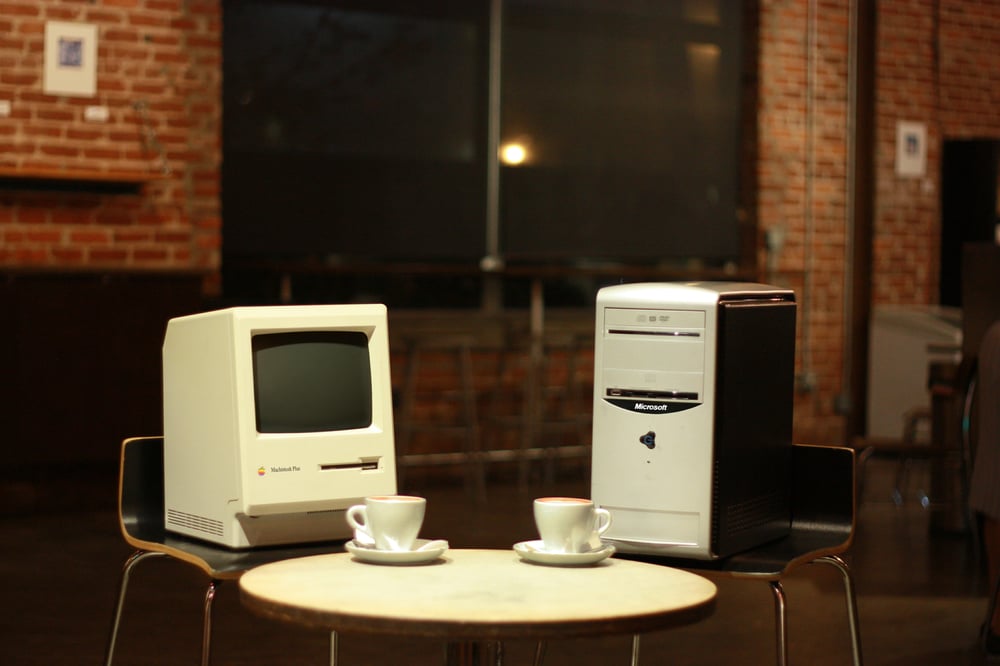
A while back our founder, Mike Landman, answered some questions for Smart Business Magazine about Macs in a PC world. Here’s that conversation..
SBM: How is it that Macs have gone from being the computer of choice only for graphic designers to becoming a popular choice for mainstream computer users in business?
Well, Macs always had a reputation of being easy to use, but, for a variety of reasons, lost the business market to Microsoft after the release of Windows ’95. It really wasn’t until after the iPod that things began to shift. Everyone started using iPods, then iPhones, and a ‘Halo Effect’ started making people curious about Macs. That led to an increasing use of Macs for people at home. For a lot of people, they started wondering why they couldn’t use their Mac at work. So it was, in many ways, a home-user invasion of business.
SBM: So why would a business want to take a look at Apple? What are the advantages?
Right now, businesses are often not looking at Macs at all. They just come in the door. When the CEO starts using his Mac at work, things start to shift for IT people. They are often thrust into the world of Macs, and its trickier cousin — cross-platform networks — as the PC network has to begin accommodating the Macs. I would suggest that a business is better served if it has a Mac strategy in place now, rather than having rogue Macs popping up in the office. The reasons people want to use them usually boil down to:
• Macs are cool. This might seem like a silly reason, but there is value in the cool factor. People used to dismiss cool offices, casual work attire, flexible work schedules and other ‘squishy’ work things too. Increasingly, people want the computer they use to be something they like to work on. More and more, that’s Macs. Happy people is a high-value strategy.
• Macs are less vulnerable to viruses and malware. There are basically no serious Mac viruses in the wild today. In the future, that probably won’t be true. But the Mac world will start some 300,000 viruses behind, so it’s a safe bet that Macs will be less prone for the foreseeable future.
• Lots of business software runs on Macs. With the release of Microsoft Office 2011, the last gross vestige of incompatibility (an Outlook client) is gone. So, The Office Suite, Adobe Creative Suite, Quickbooks and many others have Mac native versions. Cloud apps also run very well on Macs since Safari is one of the most Web-standards compliant browsers available (Macs can also run Chrome and Firefox).
SBM: What are the disadvantages of having Macs at work?
The disadvantages are generally compatibility issues. Those break down into two categories:
• Some business software either doesn’t exist for the Mac, or the Mac version is different. A lot of accounting packages, including Quickbooks, have different functionality. There are legacy apps that were written for PC that are not being actively developed. And there are a lot of apps out there for the PC that just don’t exist on the Mac. So it’s not for everyone.
• There are issues of network compatibility. Network issues are nearly all non-issues with IT people that have a track record of experience integrating Macs and PCs. But for a system admin or an IT company that is new to Mac and PC support, there is no shortage of ‘gotchas.’ File naming conventions, file server configuration, e-mail setup and configuration, fonts and Active Directory authentication are the most common issues. That’s generally why we think it’s best to have your Mac strategy in place before the Macs come walking in the door.
SBM: What if someone wants to use a Mac but needs to access applications that are only available on PC?
There are a number of solutions for that, some more complex than others. Generally, there are two options though: Running PC virtualization software on your Mac (Parallels or VMware Fusion), or accessing PC applications using server-based solutions like Citrix XenApp or Microsoft Terminal Services. If it’s a few people needing a handful of apps, local virtualization is probably most effective. If it’s lots of users, then server-based needs to be considered.
SBM: One thing we hear is that Macs are more expensive. Are they worth the cost?
Macs are more expensive, but I think that issue is negligible. Here’s a few considerations: Macs generally have no truly bare bones configurations. But for most business users, bare bones won’t work anyway. So the purchase price is often much closer after the computer is configured the way a business will need it. Macs hold their value. After using a Mac for three years, it has a decent value on places like eBay. PCs are usually depleted of their value, and we often find that businesses have to pay to have them taken away.
One thing to beware of is that Macs come with only a one-year warranty included. Most business-class PCs have a three-year warranty, which we would recommend. So it’s usually best to buy an extra two years from Apple. That adds to the price. In the end, a comparable Mac might be $200 more than its PC counterpart. Over three years, including interest, that’s going to be about $8 a month per user. Probably less than a company spends on coffee. So my feeling is that if it will make an employee happy or more productive, it’s probably worth the eight bucks. That said, costs will go up dramatically if you don’t have a properly configured network or the support you need, so a proactive strategy for handling Mac users is the best bet for making a transition smooth and keeping costs down.
Don't Fall Behind!
Get the latest work-from-home and Humans First® IT tips straight to your inbox.